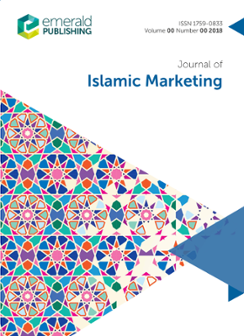Journal of Islamic Marketing
Issue(s) available: 78 – From Volume: 1 Issue: 1, to Volume: 15 Issue: 5

Volume 14
Volume 13
Volume 12
Volume 2
The interplay of culture, religion and luxury consumption: a cross-national investigation
Nermain Al-Issa, Nathalie Dens, Piotr KwiatekThis study aims to examine differences in the perceived value of luxury as drivers of luxury purchase intentions between individualist and collectivist cultures (at a country…
What drives prospective investors to support small and medium enterprises via Islamic securities crowdfunding? An empirical evidence from Indonesia
Rifaldi MajidThe presence of securities crowdfunding (SCF) FinTech in the Islamic financial landscape opens investment opportunities through shares and sukuk (Sharia bond) instruments. This…
The paradox of Islamic perception on the entrepreneurial intentions of female Muslims in Pakistan
Mohammad Saud Khan, Bronwyn Pamela Wood, Sarfraz Dakhan, Asif NawazThis paper aims to examine female entrepreneurship perceptions at the nexus of understandings of Muslim behaviour in Pakistan, the “formula” of Shapero for considering…
The mediating effects of perceived brand integrity on brand ethical behavior and corporate brand legitimacy in halal cosmetics
David AmaniThis study aims to examine the impact of brand ethical behavior, specifically perceived brand ethicality, on corporate brand legitimacy in the context of halal cosmetics, by…
Does financial technology improve intention to pay zakat during national economic recovery? A multi-group analysis
Lu'liyatul Mutmainah, Izra Berakon, Rizaldi YusfiartoZakat has succeeded in becoming one of the safety nets for welfare during the crisis. As a result, continuous improvement is a necessity, especially through strengthening…
Technology acceptance model in halal industries: a systematic literature review and research agenda
Nurhafihz NoorThe continued relevance of technologies in halal industries requires managers to understand the factors contributing to such technologies’ acceptance. The technology acceptance…
Online cash waqf behavioral intention: the role of knowledge of cash waqf and trust
Asyari Asyari, Mohammad Enamul Hoque, Perengki Susanto, Halima Begum, Awaluddin Awaluddin, Marwan Marwan, Abdullah Al MamunThis study aims to explore the determinants that impact state Islamic University/Perguruan Tinggi Keagamaan Islam Negeri students’ intention to adopt online cash waqfs. In doing…
Factors that determine Islamic entrepreneurial intention: an empirical investigation using two country samples
Minhajul Islam Ukil, Ehsanul Islam Ukil, Muhammad Shariat Ullah, Abdullah AlmashayekhiIslam describes business as a legitimate means of halal income. However, little is known about what attracts people towards Islamic entrepreneurship or halalpreneurship. By…
The role of trust and perceived risk on Muslim behavior in buying halal-certified food
Hardius Usman, Nucke Widowati Kusumo Projo, Chairy Chairy, Marissa Grace HaqueThe purpose of this study to examine the factors that encourage/inhibit Muslim behavior in buying halal-certified food (HCF), based on two theories, the…
The role of metaverse and blockchain in enhancing digital Islamic finance: empirical perspective
Manaf Al-Okaily, Ayman Abdalmajeed AlsmadiThis study aims to investigate the connections between the adoption of technology, user experience (UX), financial transparency and accountability, specifically focusing on the…
Understanding and overcoming the obstacles in Muslim female athlete branding
Ali Hasaan, Adele Berndt, Mücahit FişneThe increased importance of sports and athlete brands highlights the need for athletes to pay attention to branding as it has positive impacts. As athletes, Muslim women have not…
Millennial generation awareness of halal supply chain knowledge toward purchase intention for halal meat products: empirical evidence in Indonesia
Dina Hanifasari, Ilyas Masudin, Fien Zulfikarijah, Aniek Rumijati, Dian Palupi RestuputriThis paper aims to investigate the impact of halal awareness on the relationship between halal supply chain knowledge and purchase intention for halal meat products in the…
Financial technology readiness for Shariah-compliant banking services: post-merger perspectives
Desi Tri Kurniawati, Yudi Fernando, M. Abdi Dzil Ikhram W., MasyhuriThe mergers and acquisitions impact the firm’s marketing strategy to target the potential market. To compete with conventional banks, Shariah banks have accommodated financial…
Halal cosmetics: a technology-empowered systematic literature review
Christine Wan Shean Liew, Noorliza KariaGlobally, the halal cosmetics market is experiencing rapid growth and is considered a key economic driver in shaping economy development and growth. However, the extant research…
Name order effects on cobrand perceptions: the impacts of product similarity and language structure
John J. Sailors, Jamal A. Al-Khatib, Tarik Khzindar, Shaza EzziThe Islamic world spans many different languages with different language structures. This paper aims to explore one way in which language structure affects consumer response to…
The intention to adopt metaverse in Islamic banks: an integrated theoretical framework of TAM and religiosity intention model
Hashem Alshurafat, Omar Arabiat, Maha ShehadehThis paper aims to explore the intention to adopt the Metaverse in Islamic banks, with a particular focus on evaluating perceived usefulness, ease of use, user satisfaction and…
ISSN:
1759-0833Online date, start – end:
2010Copyright Holder:
Emerald Publishing LimitedOpen Access:
hybridEditor:
- Prof Jonathan Wilson
